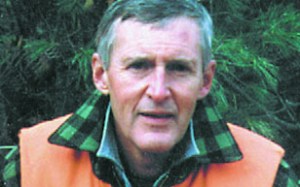Most states have their own unique selection process for picking a Fish and Wildlife Commissioner. Clearly, some are better than others.
Maine’s commissioner is purely a political appointee. The governor can appoint just about any political crony he chooses, although his selection must pass muster with the state legislature. With good reason, more and more Maine sportsmen are convinced that there has to be a better method for selecting a leader to run the Maine Department of Inland Fisheries and Wildlife. For one thing, there ought to be some specific, well thought out qualification criteria for this important post. In these complex and challenging times, merely having held a fishing and hunting license hardly qualifies a person to head up the department. Additionally, a candidate for Fish and Wildlife Commissioner should be, whenever possible, a known quantity, a person already respected by the outdoor community with measurable administrative experience and knowledge.
Relying on political patronage has not worked well over the years when it comes to picking a commissioner. Of course, the governor is popularly elected and should have a say in who makes up his cabinet. You can’t take politics completely out of the equation. But it is possible to minimize the role of politics and give a candidate’s qualifications a more prominent status in making the right choice.
Isn’t it time to restructure how we select our Fish and Wildlife Commissioner?
In the upcoming August issue of the Northwoods Sporting Journal, New Hampshire outdoor writer Bill Carney explains the process used by New Hampshire in selecting its commissioner. Basically, New Hampshire’s fish and game clubs select an 11-member commission of sportsmen who send three names to the governor. In effect, the governor may then select one of the three to be his new Fish and Wildlife Commissioner. Makes sense, doesn’t it? According to Maine Secretary of State Matt Dunlap, a former legislator, this change could happen in Maine by legislative action and would not require a public referendum or state constitutional amendment.
Reformist Teddy Roosevelt, when he was New York’s governor, was infuriated by the politicization of that state’s fish and wildlife office. He said that his commission “was packed with self-serving politicians who didn’t know flickers from juncos.” TR changed things quickly. Maine must — more than 100 years later — take a lesson from Gov. Roosevelt and purge party politics from the process that we use to select a Commissioner of the Maine Department of Inland Fisheries and Wildlife.
Smith Retires
These must be changing times. After 18 years, George Smith, the executive director of the Sportsman’s Alliance of Maine is stepping down. Smith has been a highly visible and skilled spokesman for Maine’s venerable sportsman lobby. In reflecting on Smith’s contribution, SAM President Jim Gorman, said it perfectly, “His strong voice has been our voice, his achievements have been significant and lasting.”
Yes, Smith, like all of the rest of us, is not indispensable. And, like any person who rises to a point of power and influence, Smith has had some detractors. But on balance he not only represented SAM well, he represented sportsman of Maine and their causes with razor-sharp wit, intelligence, dignity and uncommon interpersonal skills. Smith is an action guy who always did his homework. He will be replaced, but he will be a hard act to follow. Smith started his SAM post back in 1993 with a clear advantage: he already knew his way around the legislative halls, literally and figuratively. And it showed in his win-loss record.
Among his proudest achievements in SAM’s behalf, he includes the successful defeat of the bear referendum, saving the Maine moose hunt, protection of Fish and Wildlife revenues and the safe-guarding of Maine’s true wild trout populations.
During a recent radio interview that I did with Smith, he reminded me that “this was not his obituary.” Indeed, you know that we sportsmen have not heard the last of Mr. Smith. In fact, one of his post-SAM projects, he says, will be to work with the Nature Conservancy, SAM and other outdoor organizations in finding a reliable funding source for the Fish and Wildlife Department.
That’s a tall order for Smith, but he just might surprise us all.
V. Paul Reynolds is editor of the Northwoods Sporting Journal and has written his first book, A Maine Deer Hunter’s Logbook. He is also a Maine Guide, co-host of a weekly radio program “Maine Outdoors” heard Sundays at 7 p.m. on The Voice of Maine News-Talk Network (WVOM-FM 103.9, WCME-FM 96.7) and former information officer for the Maine Dept. of Fish and Wildlife. His e-mail address is [email protected].

Comments are no longer available on this story